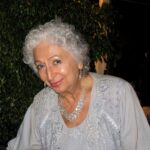“I chose rheumatology because it was new and exciting,” says Dr. Kitridou. “In medical school, I had precious little exposure to rheumatology. During my residency at Hahnemann, a very inspiring young associate taught rheumatology. That inspired me to pursue this subspecialty.”
“In the early days, there were more traditional notions about women as professionals,” Dr. Kitridou continues. “There were lots of challenges in terms of establishing and building a career. But, even back then, I can give you many examples of wonderful, grateful patients and colleagues who helped me grow as a rheumatologist.”
Dr. Hahn is a professor of medicine and chief of the division of rheumatology at the University of California, Los Angeles (UCLA) David Geffen School of Medicine. Prior to joining UCLA, she served as associate professor of medicine at Washington University in St. Louis. Dr. Hahn received her undergraduate degree from Ohio State University in Columbus and her medical degree from Johns Hopkins University in Baltimore. She completed her internship and rheumatology training at Washington University in St. Louis. Dr. Hahn has served as a volunteer board member of the ACR Research and Education Foundation (REF) and president of the ACR. She was instrumental in the formation of the ACR Women in Rheumatology Subcommittee, and also served on the ACR 75th Anniversary Task Force.
“When I began my career, there was a struggle for acceptance that’s different now,” says Dr. Hahn. “I felt a strong conflict with home obligations and demands at work. It wasn’t accepted then to have a work/life balance. Now, we all strive for balance in life.”
“The growing number of women in rheumatology, and in all of medicine, is changing the way we practice,” Dr. Hahn continues. “Today, we are more interested in balance in our life and working in teams to provide patients with the best care possible.”
Dr. Kitridou adds, “Women are compassionate and adept at building long-term bonds with patients and with their families. I find the relationships we have with our patients’ families to be very rewarding. We work together as a team with the family to bring about success for the patient.”
Advice for the Future Generation
“The sky is the limit today. Learn to listen. We have a tendency as physicians and scientists to rely on labs and imaging findings,” says Dr. Kitridou. “Those are important, but what is sometimes more important is what information comes from the patient. Try to put yourself in your patient’s shoes—the patient knows where the pain and swelling is, what brings on the symptoms, and what provides relief. Listen, listen, listen.”
